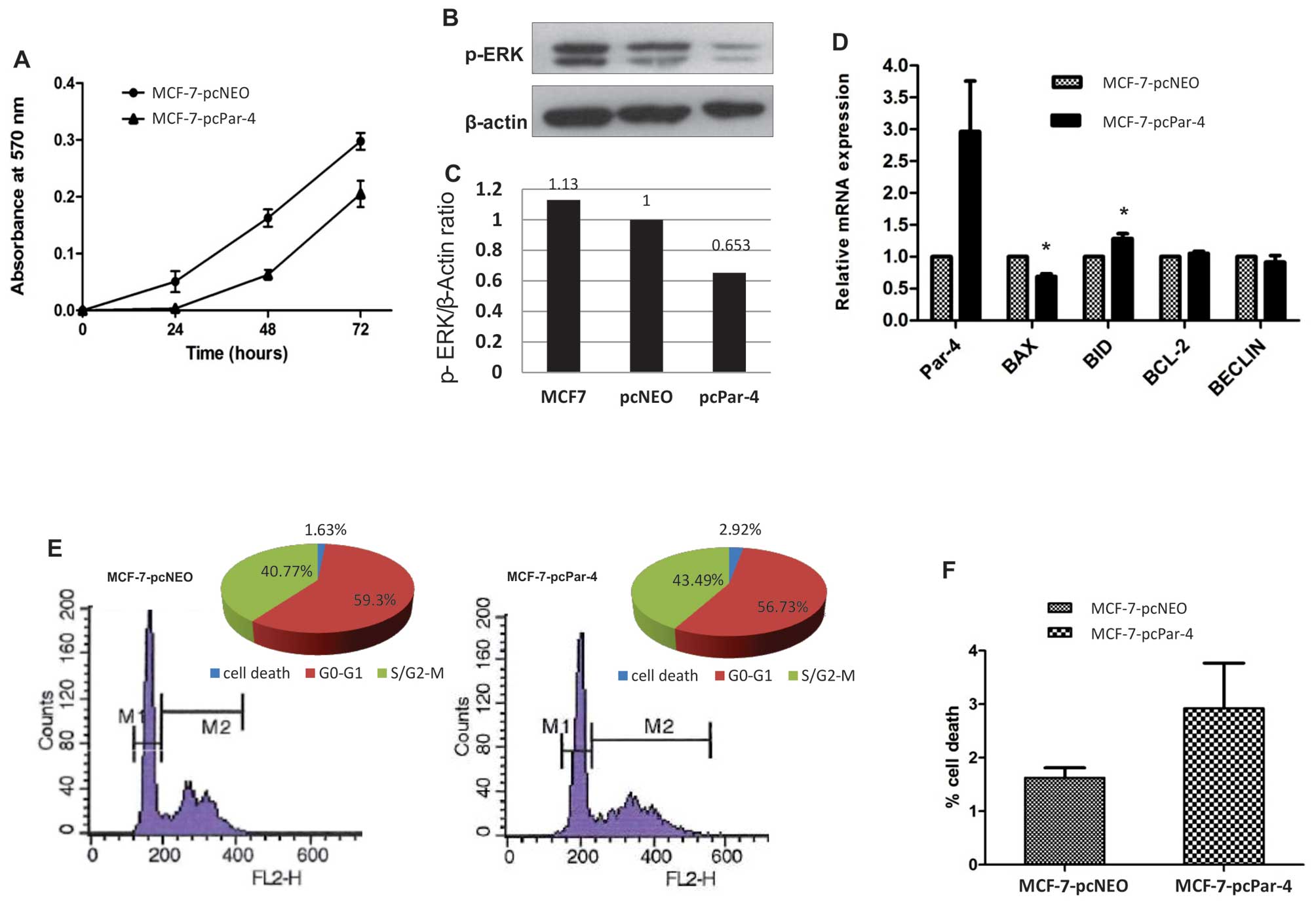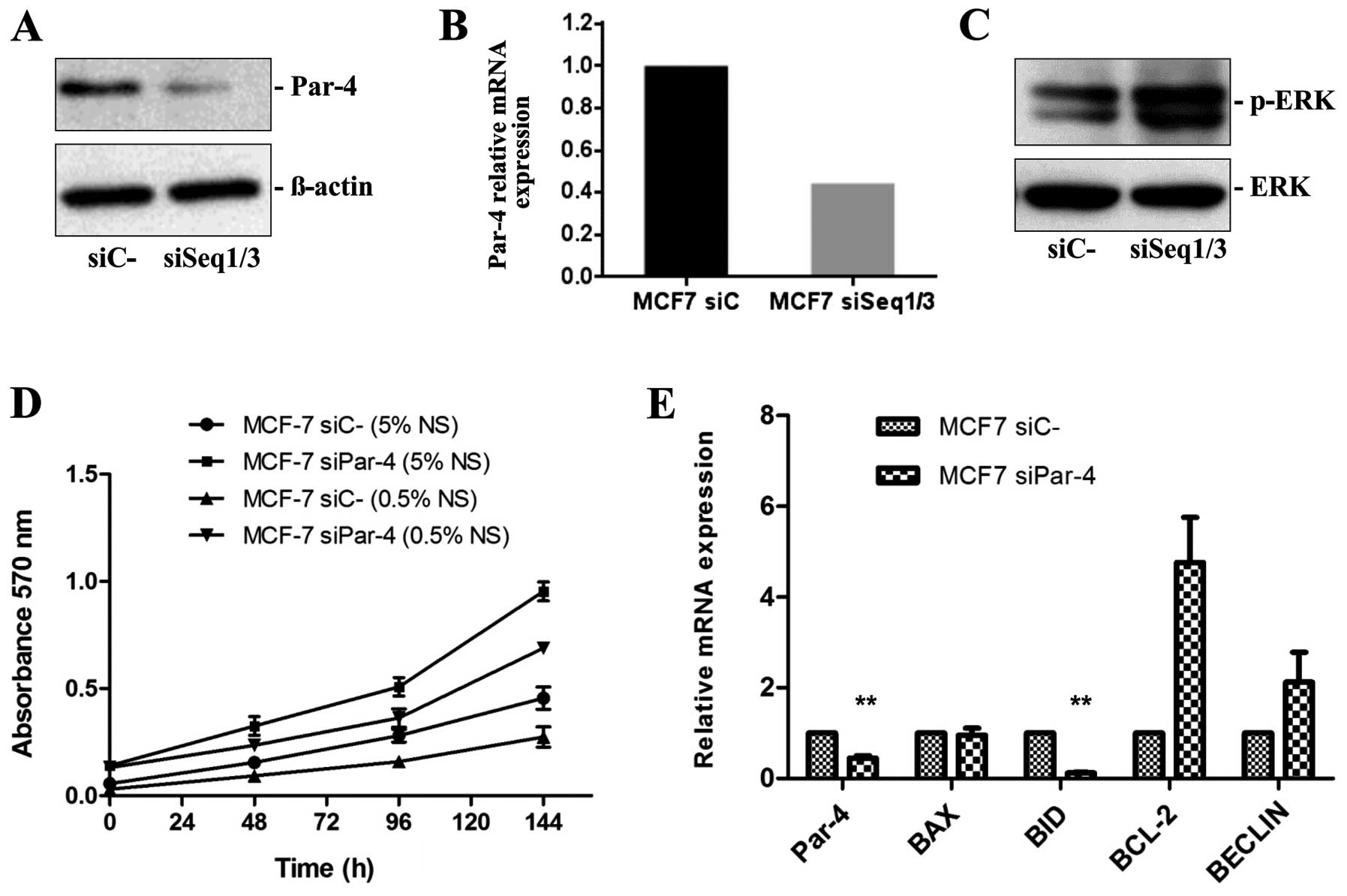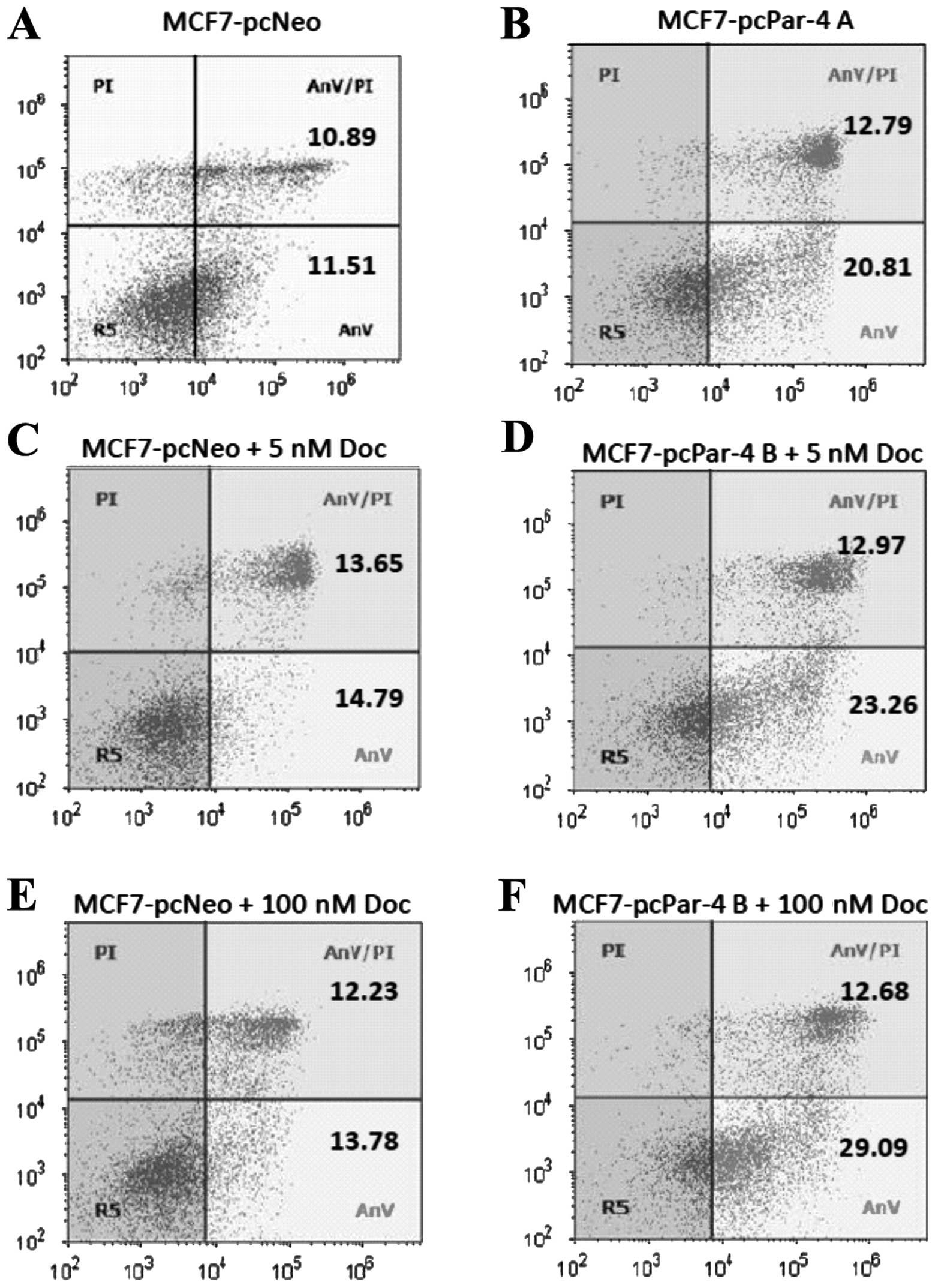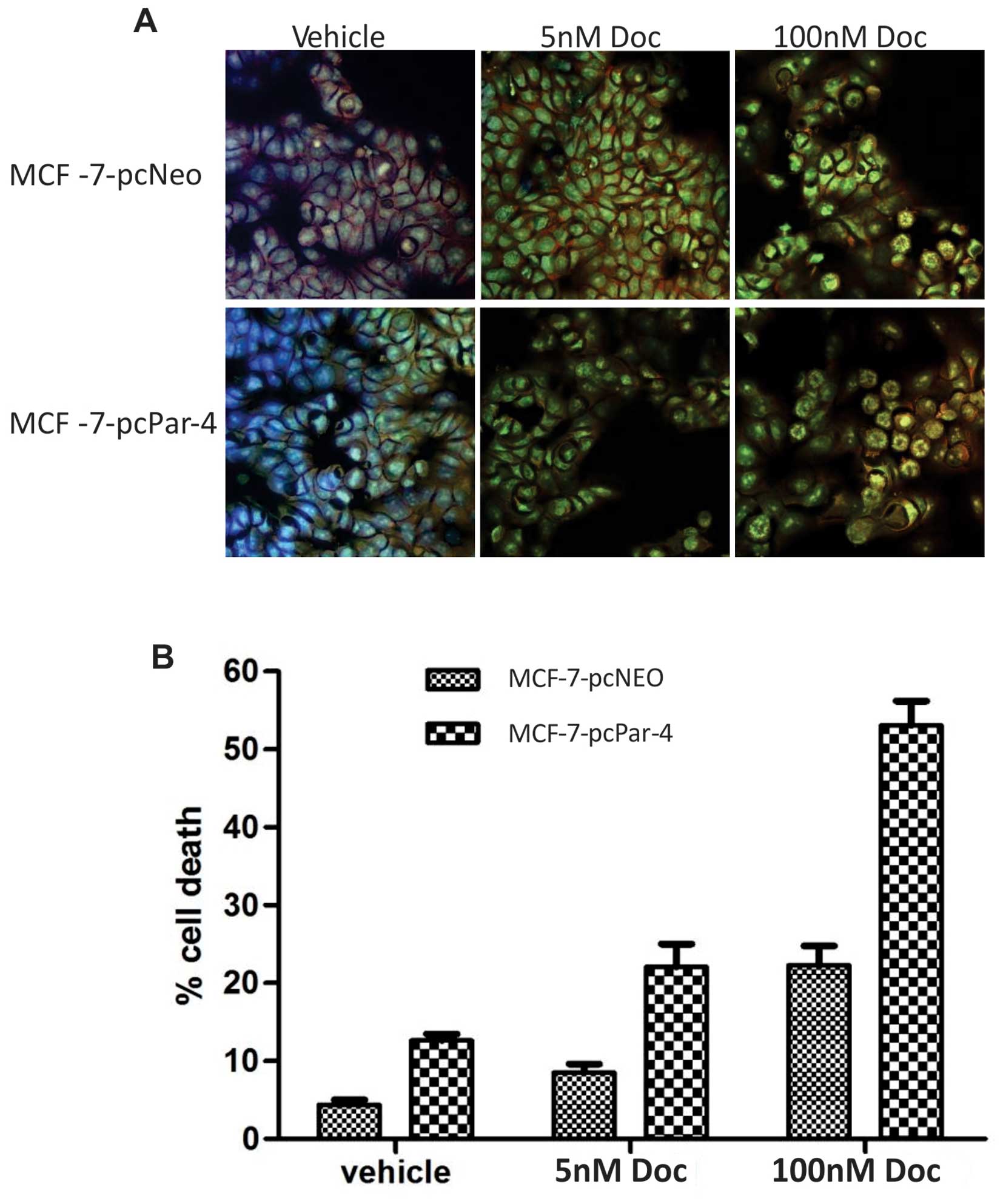|
1.
|
Macciò A and Madeddu C: Obesity,
inflammation and post-menopausal breast cancer: therapeutic
implications. TSWJ. 11:2020–2036. 2011.
|
|
2.
|
Parton M, Dowsett M and Smith I: Studies
of apoptosis in breast cancer. BMJ. 322:1528–1532. 2001. View Article : Google Scholar : PubMed/NCBI
|
|
3.
|
Hanahan D and Weinberg RA: Hallmarks of
cancer: the next generation. Cell. 144:646–674. 2011. View Article : Google Scholar : PubMed/NCBI
|
|
4.
|
Makin G and Hickman JA: Apoptosis and
cancer chemotherapy. Cell Tissue Res. 301:143–152. 2000. View Article : Google Scholar
|
|
5.
|
Sells SF, Wood DP Jr, Joshi-Barve SS,
Muthukumar S, Jacob RJ, Crist SA, Humphreys S and Rangnekar VM:
Commonality of the gene programs induced by effectors of apoptosis
in androgen-dependent and -independent prostate cells. Cell Growth
Differ. 5:457–466. 1994.
|
|
6.
|
Sells SF, Han SS, Muthukkumar S, Maddiwar
N, Johnstone R, Boghaert E, Gillis D, Liu G, Nair P, Monnig S,
Collini P, Mattson MP, Sukhatme VP, Zimmer SG, Wood DP Jr,
McRoberts JW, Shi Y and Rangnekar VM: Expression and function of
the leucine zipper protein Par-4 in apoptosis. Mol Cell Biol.
17:3823–3832. 1997.PubMed/NCBI
|
|
7.
|
El-Guendy N and Rangnekar VM: Apoptosis by
Par-4 in cancer and neurodegenerative diseases. Exp Cell Res.
283:51–66. 2003. View Article : Google Scholar : PubMed/NCBI
|
|
8.
|
Goswami A, Ranganathan P and Rangnekar VM:
The phosphoinositide 3-kinase/Akt1/Par-4 axis: a cancer-selective
therapeutic target. Cancer Res. 66:2889–2892. 2006. View Article : Google Scholar : PubMed/NCBI
|
|
9.
|
El-Guendy N, Zhao Y, Gurumurthy S,
Burikhanov R and Rangnekar VM: Identification of a unique core
domain of par-4 sufficient for selective apoptosis induction in
cancer cells. Mol Cell Biol. 23:5516–5525. 2003. View Article : Google Scholar : PubMed/NCBI
|
|
10.
|
Zhao Y, Burikhanov R, Qiu S, Lele SM,
Jennings CD, Bondada S, Bryson S and Rangnekar VM: Cancer
resistance in transgenic mice expressing the SAC module of Par-4.
Cancer Res. 67:9276–9285. 2007. View Article : Google Scholar : PubMed/NCBI
|
|
11.
|
Gurumurthy S, Goswami A, Vasudevan KM and
Rangnekar VM: Phosphorylation of Par-4 by protein kinase A is
critical for apoptosis. Mol Cell Biol. 25:1146–1161. 2005.
View Article : Google Scholar : PubMed/NCBI
|
|
12.
|
Kögel D, Reimertz C, Mech P, Poppe M,
Frühwald MC, Engemann H, Scheidtmann KH and Prehn JH: Dlk/ZIP
kinase-induced apoptosis in human medulloblastoma cells:
requirement of the mitochondrial apoptosis pathway. Br J Cancer.
85:1801–1808. 2001.PubMed/NCBI
|
|
13.
|
Moreno-Bueno G, Fernandez-Marcos PJ,
Collado M, Tendero MJ, Rodriguez-Pinilla SM, Garcia-Cao I,
Hardisson D, Diaz-Meco MT, Moscat J, Serrano M and Palacios J:
Inactivation of the candidate tumor suppressor par-4 in endometrial
cancer. Cancer Res. 67:1927–1934. 2007. View Article : Google Scholar : PubMed/NCBI
|
|
14.
|
Cook J, Krishnan S, Ananth S, Sells SF,
Shi Y, Walther MM, Linehan WM, Sukhatme VP, Weinstein MH and
Rangnekar VM: Decreased expression of the pro-apoptotic protein
Par-4 in renal cell carcinoma. Oncogene. 18:1205–1208. 1999.
View Article : Google Scholar : PubMed/NCBI
|
|
15.
|
Nagai MA, Gerhard R, Salaorni S, Fregnani
JH, Nonogaki S, Netto MM and Soares FA: Down-regulation of the
candidate tumor suppressor gene PAR-4 is associated with poor
prognosis in breast cancer. Int J Oncol. 37:41–49. 2010. View Article : Google Scholar : PubMed/NCBI
|
|
16.
|
García-Cao I, Duran A, Collado M,
Carrascosa MJ, Martín-Caballero J, Flores JM, Diaz-Meco MT, Moscat
J and Serrano M: Tumour-suppression activity of the proapoptotic
regulator Par4. EMBO Rep. 6:577–583. 2005.PubMed/NCBI
|
|
17.
|
Chakraborty M, Qiu SG, Vasudevan KM and
Rangnekar VM: Par-4 drives trafficking and activation of Fas and
Fasl to induce prostate cancer cell apoptosis and tumor regression.
Cancer Res. 61:7255–7263. 2001.PubMed/NCBI
|
|
18.
|
Cheema SK, Mishra SK, Rangnekar VM, Tari
AM, Kumar R and Lopez-Berestein G: Par-4 transcriptionally
regulates Bcl-2 through a WT1-binding site on the bcl-2 promoter. J
Biol Chem. 278:19995–20005. 2003. View Article : Google Scholar : PubMed/NCBI
|
|
19.
|
Burikhanov R, Zhao Y, Goswami A, Qiu S,
Schwarze SR and Rangnekar VM: The tumor suppressor Par-4 activates
an extrinsic pathway for apoptosis. Cell. 138:377–388. 2009.
View Article : Google Scholar : PubMed/NCBI
|
|
20.
|
Zhao Y, Burikhanov R, Brandon J, Qiu S,
Shelton BJ, Spear B, Bondada S, Bryson S and Rangnekar VM: Systemic
Par-4 inhibits non-autochthonous tumor growth. Cancer Biol Ther.
12:152–157. 2011. View Article : Google Scholar : PubMed/NCBI
|
|
21.
|
Franchitto A, Torrice A, Semeraro R,
Napoli C, Nuzzo G, Giuliante F, Alpini G, Carpino G, Berloco PB,
Izzo L, Bolognese A, Onori P, Renzi A, Cantafora A, Gaudio E and
Alvaro D: Prostate apoptosis response-4 is expressed in normal
cholangiocytes is down-regulated in human cholangiocarcinoma and
promotes apoptosis of neoplastic cholangiocytes when induced
pharmacologically. Am J Pathol. 177:1779–1790. 2010. View Article : Google Scholar
|
|
22.
|
Casolari DA, Pereira MC, de Bessa Garcia
SA and Nagai MA: Insulin-like growth factor-1 and 17β-estradiol
down-regulate prostate apoptosis response-4 expression in MCF-7
breast cancer cells. Int J Mol Med. 28:337–342. 2011.
|
|
23.
|
McCubrey JA, Steelman LS, Chappell WH,
Abrams SL, Wong EW, Chang F, Lehmann B, Terrian DM, Milella M,
Tafuri A, Stivala F, Libra M, Basecke J, Evangelisti C, Martelli AM
and Franklin RA: Roles of the Raf/MEK/ERK pathway in cell growth,
malignant transformation and drug resistance. Biochim Biophys Acta.
1773:1263–1284. 2007. View Article : Google Scholar : PubMed/NCBI
|
|
24.
|
Johnstone RW, See RH, Sells SF, Wang J,
Muthukkumar S, Englert C, Haber DA, Licht JD, Sugrue SP, Roberts T,
Rangnekar VM and Shi Y: A novel repressor, par-4 modulates
transcription and growth suppression functions of the Wilms’ tumor
suppressor WT1. Mol Cell Biol. 16:6945–6956. 1996.PubMed/NCBI
|
|
25.
|
Qiu G, Ahmed M, Sells SF, Mohiuddin M,
Weinstein MH and Rangnekar VM: Mutually exclusive expression
patterns of Bcl-2 and Par-4 in human prostate tumors consistent
with down-regulation of Bcl-2 by Par-4. Oncogene. 18:623–631. 1999.
View Article : Google Scholar : PubMed/NCBI
|
|
26.
|
Boehrer S, Chow KU, Beske F,
Kukoc-Zivojnov N, Puccetti E, Ruthardt M, Baum C, Rangnekar VM,
Hoelzer D, Mitrou PS and Weidmann E: In lymphatic cells par-4
sensitizes to apoptosis by down-regulating bcl-2 and promoting
disruption of mitochondrial membrane potential and caspase
activation. Cancer Res. 62:1768–1775. 2002.PubMed/NCBI
|
|
27.
|
Chan SL, Tammariello SP, Estus S and
Mattson MP: Prostate apoptosis response-4 mediates trophic factor
withdrawal-induced apoptosis of hippocampal neurons: actions prior
to mitochondrial dysfunction and caspase activation. J Neurochem.
73:502–512. 1999. View Article : Google Scholar
|
|
28.
|
Pearson G, Robinson F, Beers Gibson T, Xu
BE, Karandikar M, Berman K and Cobb MH: Mitogen-activated protein
(MAP) kinase pathways: regulation and physiological functions.
Endocr Rev. 22:153–183. 2001.PubMed/NCBI
|
|
29.
|
Nakano H, Shindo M, Sakon S, Nishinaka S,
Mihara M, Yagita H and Okumura K: Differential regulation of
IkappaB kinase alpha and beta by two upstream kinases,
NF-kappaB-inducing kinase and mitogen-activated protein kinase/ERK
kinase kinase-1. Proc Natl Acad Sci USA. 95:3537–3542. 1998.
View Article : Google Scholar
|
|
30.
|
Gurumurthy S and Rangnekar VM: Par-4
inducible apoptosis in prostate cancer cells. J Cell Biochem.
91:504–512. 2004. View Article : Google Scholar : PubMed/NCBI
|
|
31.
|
Shrestha-Bhattarai T and Rangnekar VM:
Cancer-selective apoptotic effects of extracellular and
intracellular Par-4. Oncogene. 29:3873–3880. 2010. View Article : Google Scholar : PubMed/NCBI
|
|
32.
|
Degterev A and Yuan J: Expansion and
evolution of cell death programmes. Nat Rev Mol Cell Biol.
9:378–390. 2008. View
Article : Google Scholar
|
|
33.
|
Youle RJ and Strasser A: The BCL-2 protein
family: opposing activities that mediate cell death. Nat Rev Mol
Cell Biol. 9:47–59. 2008. View
Article : Google Scholar : PubMed/NCBI
|
|
34.
|
Simstein R, Burow M, Parker A, Weldon C
and Beckman B: Apoptosis, chemoresistance and breast cancer:
insights from the MCF-7 cell model system. Exp Biol Med.
228:995–1003. 2003.PubMed/NCBI
|
|
35.
|
Galluzzi L, Vitale I, Abrams JM, Alnemri
ES, Baehrecke EH, Blagosklonny MV, Dawson TM, Dawson VL, El-Deiry
WS, Fulda S, Gottlieb E, Green DR, Hengartner MO, Kepp O, Knight
RA, Kumar S, Lipton SA, Lu X, Madeo F, Malorni W, Mehlen P, Nuñez
G, Peter ME, Piacentini M, Rubinsztein DC, Shi Y, Simon HU,
Vandenabeele P, White E, Yuan J, Zhivotovsky B, Melino G and
Kroemer G: Molecular definitions of cell death subroutines:
recommendations of the Nomenclature Committee on Cell Death 2012.
Cell Death Differ. 19:107–120. 2012. View Article : Google Scholar : PubMed/NCBI
|
|
36.
|
MacLean MA, Scott BE, Deziel BA, Nunnelley
MC, Liberty AM, Gottschall-Pass KT, Neto CC and Hurta RA: North
American cranberry (Vaccinium macrocarpon) stimulates apoptotic
pathways in DU145 human prostate cancer cells in vitro. Nutr
Cancer. 63:109–120. 2011.
|
|
37.
|
Boehrer S, Kukoc-Zivojnov N, Nowak D,
Bergmann M, Baum C, Puccetti E, Weidmann E, Hoelzer D, Mitrou PS
and Chow KU: Upon drug-induced apoptosis expression of
prostate-apoptosis-response-gene-4 promotes cleavage of caspase-8,
bid and mitochondrial release of cytochrome c. Hematology.
9:425–431. 2004. View Article : Google Scholar : PubMed/NCBI
|
|
38.
|
Chendil D, Das A, Dey S, Mohiuddin M and
Ahmed MM: Par-4, a pro-apoptotic gene inhibits radiation-induced NF
kappa B activity and Bcl-2 expression leading to induction of
radiosensitivity in human prostate cancer cells PC-3. Cancer Biol
Ther. 1:152–160. 2002. View
Article : Google Scholar : PubMed/NCBI
|
|
39.
|
Crown J and O’Leary M: The taxanes: an
update. Lancet. 355:1176–1178. 2000. View Article : Google Scholar : PubMed/NCBI
|
|
40.
|
Morse DL, Gray H, Payne CM and Gillies RJ:
Docetaxel induces cell death through mitotic catastrophe in human
breast cancer cells. Mol Cancer Ther. 4:1495–1504. 2005. View Article : Google Scholar : PubMed/NCBI
|
|
41.
|
Hernández-Vargas H, Palacios J and
Moreno-Bueno G: Molecular profiling of docetaxel cytotoxicity in
breast cancer cells: uncoupling of aberrant mitosis and apoptosis.
Oncogene. 26:2902–2913. 2007.PubMed/NCBI
|
|
42.
|
Kline CL, Shanmugavelandy SS, Kester M and
Irby RB: Delivery of PAR-4 plasmid in vivo via nanoliposomes
sensitizes colon tumor cells subcutaneously implanted into nude
mice to 5-FU. Cancer Biol Ther. 8:1831–1837. 2009. View Article : Google Scholar : PubMed/NCBI
|
|
43.
|
Brieger A, Boehrer S, Schaaf S, Nowak D,
Ruthardt M, Kim SZ, Atadja P, Hoelzer D, Mitrou PS, Weidmann E and
Chow KU: In bcr-abl-positive myeloid cells resistant to
conventional chemo-therapeutic agents, expression of Par-4
increases sensitivity to imatinib (STI571) and histone
deacetylase-inhibitors. Biochem Pharm. 68:85–93. 2004. View Article : Google Scholar
|
|
44.
|
Lee TJ, Lee JT, Kim SH, Choi YH, Song KS,
Park JW and Kwon TK: Overexpression of Par-4 enhances
thapsigargin-induced apoptosis via down-regulation of XIAP and
inactivation of Akt in human renal cancer cells. J Cell Biochem.
103:358–368. 2008. View Article : Google Scholar : PubMed/NCBI
|


















